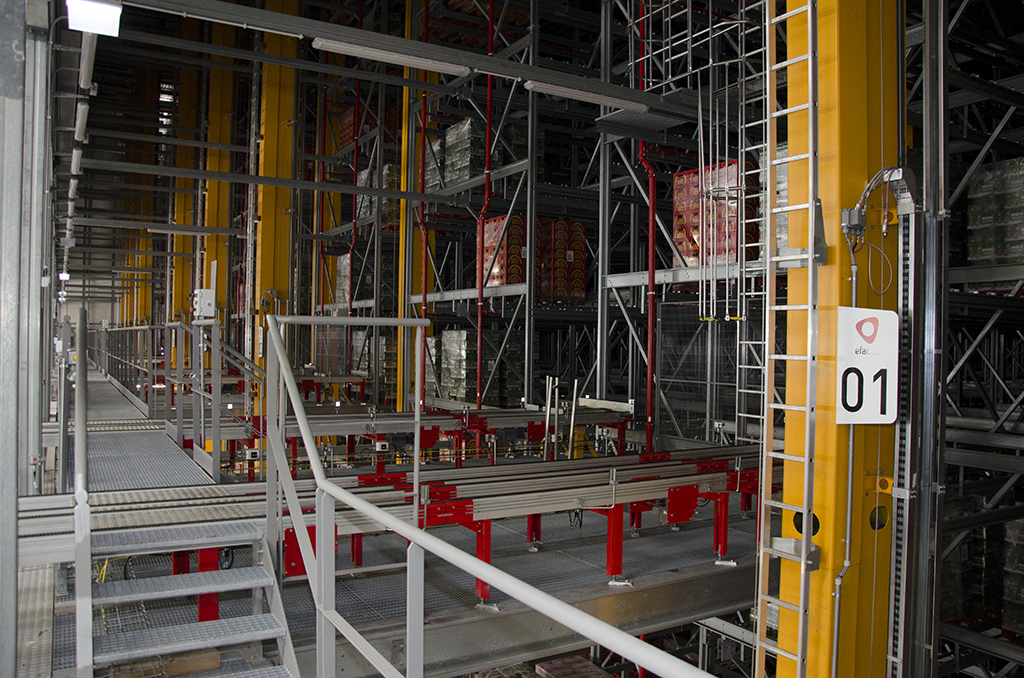BASED in Portugal, Efacec Handling Solutions S.A. supplies the global market with system integration and automated conveyor technology and storage systems. The company’s headquarters in Southeast Asia is Efacec Singapore Pte Ltd, where Jorge Cuoto is currently serving as Managing Director. In this exclusive interview, Mr Cuoto talks about how changing trends in the food and beverage industry favor the use of automation in warehousing.

Jorge Cuoto, Managing Director at Efacec Singapore Pte Ltd
You have a twin role so to speak, that of managing director and the one in charge of the company’s business development activities in the SEA region. Please tell us more about this function.
As the Managing Director of Efacec Singapore, my responsibilities include expanding Efacec’s business within the Singapore market, as well as coordinating all of Efacec’s handling solutions and activities in Asia Pacific. Since Efacec Singapore’s acquisition by Körber Logistics last year, I interact with the new management regularly to make joint decisions about Efacec’s future strategies for this region.
Separately, I also sit on the Board of Directors for Efacec’s operations in India. My role at Efacec has been fulfilling as I’ve had the opportunity to play a global role, while still handling the local market for Singapore.
What are the automated warehousing solutions and services available from Efacec?
As a leading provider of automated conveyor technology and storage systems, Efacec offers myriad automated warehouse technologies. One is the Warehouse Management System (WMS) which we developed in-house, an advanced logistics execution system that helps manufacturers to monitor and maintain high standards of quality control across all warehouse activities. Other automated warehousing technologies from Efacec include identification solutions such as barcoding and Radio-Frequency Identification (RFID), as well as order-picking technologies like pick-to-light, voice-directed technology, and sortation systems.
Efacec also offers several conveying configuration solutions such as shuttle cars, overhead monorail systems, rail guided vehicles, vertical pallet lifter, and traditional conveyors. Efacec’s Automatic Storage and Retrieval System (ASRS) is also popular with manufacturers, as the solution reduces reliance on human labor, creates safer workplaces, and enhances overall warehouse security.
Separately, our engineers also excel at providing maintenance services for complete systems, whether or not they are designed by Efacec. In particular, our team in Singapore is especially competent at retrofitting older ASRS systems, including models sold by other third-party suppliers. We also regularly seek out new ways to enhance the customer’s Efacec experience at different stages such as after-sales, project management, sales and marketing, and programming. In a nutshell, Efacec has the logistics expertise and capabilities to support manufacturers through each step of their storage and handling processes.
Are all your warehousing equipment from Portugal?
Designed and developed in Europe, Efacec’s automated warehousing solutions stand up to the high-quality standards that are adopted by and expected of European companies. At Efacec, we only deliver reliable ‘Made-in-Europe’ solutions to all our customers globally, and we have chosen to keep it that way regardless of the economic changes and challenges that we have faced over the years.
What trends do you see affecting the Asian market (or Southeast Asia)?
Having been in Asia for the past 20 years, Efacec is well informed of the challenges and trends in this region.
One, we expect continued growth in the demand for deep freeze storage suppliers in Asia. Deep freeze projects are common in Europe, as Europeans consume large amounts of frozen food. Comparatively, this trend has not yet carried over to Asia because consumers here have a greater preference for fresh produce. However in Asia, changing diet trends towards more convenient and frozen foods have led to adjustments in manufacturers’ warehousing management needs as well.
Besides deep freeze applications, there remains numerous project opportunities in this region for Efacec. Of late, we have observed more inquiries for automated logistics handling solutions as companies explore and integrate new concepts like e-commerce. As demonstrated by our growing list of references including PT Indolakto – the largest local producer of dairy goods in Indonesia, and PT Smart – one of Indonesia’s largest publicly-listed palm-based companies, Efacec’s wide range of in-house technologies and our global expertise places us in a favorable position to support F&B manufacturers.
Moving forward, we expect that adoption of automated technologies in the industry will increase among food manufacturing companies, as well as with food distribution companies such as supermarkets and third party logistics firms.


Increasing concerns over food safety drive demand for automated warehousing solutions
Having observed this market, are manufacturers now more receptive towards investing in automation?
In the past, warehouses in the F&B industry were largely managed manually. But as one of the fastest growing sectors globally, the F&B industry recognized that manual warehousing processes were not able to keep pace with the increase in business activities. Automated warehousing solutions, on the other hand, can support the business process easily, and can also help manufacturers abide by strict regulations to create a safe working environment for all employees.
Additionally, with food safety a paramount concern in this industry, warehouses specially designed for food storage and handling have convinced manufacturers to invest in automated warehousing solutions. Previously, warehouses were made to fit all purposes, with little concern for proper food storage and handling. But with advancements in technology and rising demand for proper food storage equipment from savvy food manufacturers, there are now more advanced warehouses available to ensure food safety and stability. By incorporating automated warehouse technologies that can control processes, temperatures, and humidity levels, F&B leaders can maintain food freshness and avoid cross contamination or unsafe food handling.
Better defined and enforced warehousing regulations have also influenced manufacturers to upgrade existing warehouse equipment to handle different types of food inventory. For years, manufacturers have focused on integrating automated technologies into their production and packaging processes. They are now looking to manage their end line operations more effectively by pumping more resources into automating the warehouse and its processes for higher performance.
Due to the above factors, manufacturers have indeed become more savvy and welcoming about adopting automated warehousing solutions.
What solutions typically fit the ASEAN market, which is generally made up of SMEs? What are the usual solutions recommended to SEA customers seeking Efacec’s products and services?
There is no ‘standard suite of solutions’ as every customer is different. Efacec finds it important to have a consultation with each prospect to specifically discuss the various warehousing challenges that they face and the changes that they hope to achieve. Only when our engineers understand the specific challenges can they recommend appropriate solutions. At Efacec, we strongly believe that ‘one size does not fit all’, and our approach is to tailor-make warehousing solutions for our customers. This way, we are better able to effectively target customers’ concerns, enabling them to fulfil their warehousing goals.
That said, we do see our customers in this region lean towards Efacec’s ASRS solution due to its many advantages. As the solution maximizes the use of ceiling space, it is an optimal storage solution for smaller warehouses. The flexible storage solution also allows manufacturers to adapt its warehouse for future needs, eliminating the need for off-site storage and external expansions.
What is your comment on the readiness of companies to adopt Industry 4.0 in Asia?
Technology is fast developing at an unprecedented pace and we expect some spillover effect into logistical operations. As mentioned earlier, more and more manufacturers are shifting their focus to automating their warehouses for higher productivity, and many of them are already incorporating elements of automation within their warehousing processes. Automation in the warehouse will only become more commonplace and innovative as technology continues to advance in the near future.
A major benefit to the warehouse environment resulting from the impending fourth industrial revolution will be an overall reduction in downtime. With the onset of Industry 4.0, we can expect to see automation integrated in all aspects of the supply chain, including production, storage, delivery, transport management, and more. Technological advancement will ultimately change businesses’ competitiveness across industries, and in order to stay ahead of the game, manufacturers will likely be increasingly keen to implement solutions such as just-in-time warehouse maintenance and delivery to support efficient business processes.
Nike Kyrie 5













